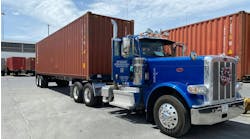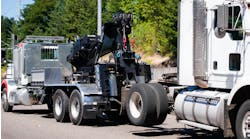Coming in just under a court-imposed deadline of Jan. 31, 2011, the Dept. of Transportation’s Federal Motor Carrier Safety Administration (FMCSA) unveiled its long-awaited electronic onboard recorder (EOBR) rule this morning. The rule, which would go into effect three years following publication of the “final rule,” would mandate nearly all motor carriers install EOBRs to monitor drivers’ Hours-of-Service (HOS).
“Under this proposal, all motor carriers currently required to maintain Records of Duty Status (RODS) for HOS recordkeeping would be required to use EOBRs to systematically and effectively monitor their drivers’ compliance with HOS requirements,” the proposed rule states. “Additionally, this proposal sets forth the supporting documents that all motor carriers currently required to use RODS would still be required to obtain and keep, as required by section 113(a) of the Hazardous Materials Transportation Authorization Act (HMTAA).”
It goes on to state that while carriers would still need to retain “some supporting documents, they would be relieved of the requirements to retain supporting documents to verify driving time.” It noted those receipts would include delivery and toll receipts as examples.
The rule exempts short-haul carriers whose drivers currently use time cards, primarily those of “property-carrying CMVs that do not require a CDL and who operate within a 150 air-mile radius of the driver’s normal work-reporting location under the current provisions.”
“We cannot protect our roadways when commercial truck and bus companies exceed Hours-of-Service rules,” said Transportation Secretary Ray LaHood. “This proposal would make our roads safer by ensuring that carriers traveling across state lines are using EOBRs to track the hours their drivers spend behind the wheel.”
FMCSA said the rule will “likely…be published sometime prior to the June 4, 2012, compliance date for the April 2010 EOBR final rule.” That rule required carriers who had “significant HOS violations” of 10% or more to install EOBRs.
The organization said that in receiving reaction on the April 2010 rule, it agreed with many of the commenters that “EOBRs with GPS or similar location data produce regular time and CMV location position histories sufficient to verify adequately a driver’s on-duty driving activities.”
“FMCSA believes this approach strikes an appropriate balance between promoting highway safety and minimizing cost and operational burdens on motor carriers in certain operations that have inherently less crash risk,” it added.
Carriers violating the EOBR requirement would face penalties of up to $11,000 per offense and impact the carrier’s CSA rating and DOT operating authority, the agency said.
“This proposal is an important step in our efforts to raise the safety bar for commercial carriers and drivers,” said FMCSA administrator Anne S. Ferro. “We believe broader use of EOBRs would give carriers and drivers an effective tool to strengthen their HOS compliance.”



